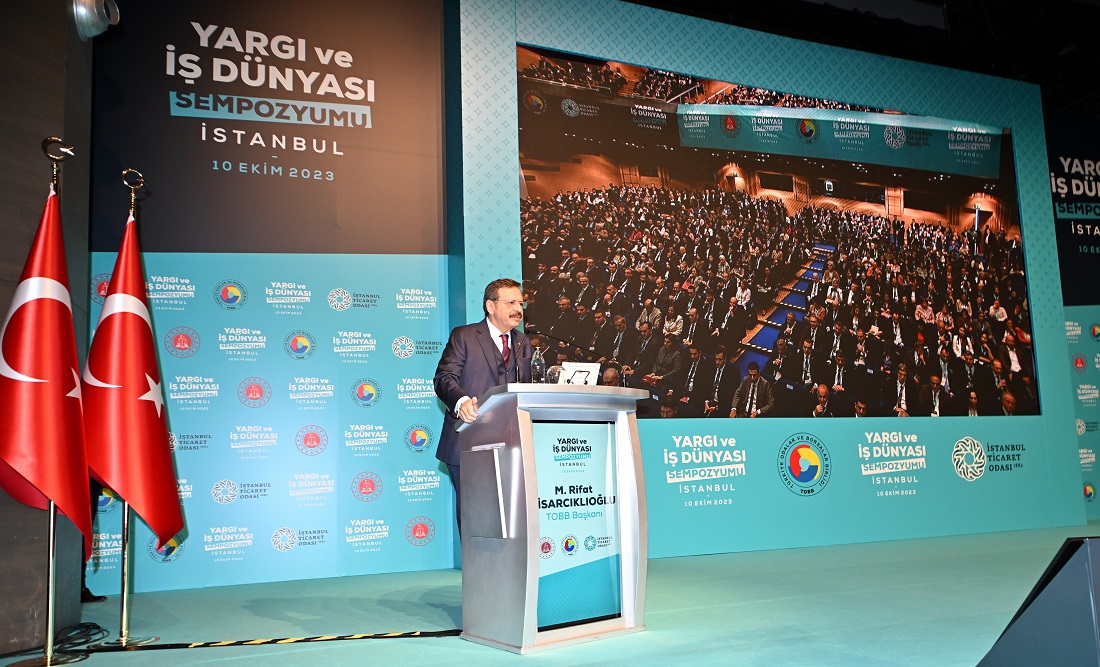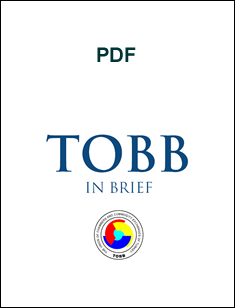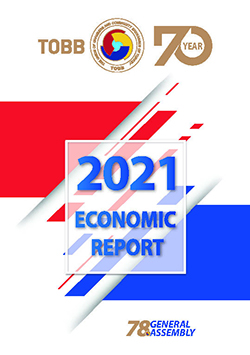“Türkiye's attractiveness in the eyes of investors has increased with the addition of arbitration to our national legislation”

10.10.2023 / İstanbul
The Judiciary and Business Symposium was held at the Haliç Congress Center with the participation of Minister of Justice Yılmaz Tunç, the Union of Chambers and Commodity Exchanges of Türkiye (TOBB) President Rifat Hisarcıklıoğlu and the İstanbul Chamber of Commerce (ITO) President Şekib Avdagiç.
At the opening of the symposium, TOBB President Hisarcıklıoğlu said that as the real sector, they attach importance to consultation with the judicial community and see the legal system as the pillar not only of the state but also of the economy.
Hisarcıklıoğlu said, “We endeavor to popularize methods such as arbitration and mediation, which will reduce the workload in the judiciary and ensure that justice is administered in a timely and correct manner, in our country and in our business world.”
Reminding that they established UYUM Mediation and Dispute Resolution Center within TOBB, Hisarcıklıoğlu said, “With TOBB UYUM Academy, we provide trainings to mediators in every field they need. Our chambers also embraced this issue and opened centers within their own bodies and made mediation widespread.”
Pointing out that time is the most important capital in commercial life, Hisarcıklıoğlu stated that every regulation that will facilitate trade, strengthen the economy and the judicial system is important and valuable for them.
Stating that in developed economies, 75 percent of commercial disputes are concluded with alternative dispute resolution methods, Hisarcıklıoğlu said that they have ensured the widespread use of arbitration.
Hisarcıklıoğlu said, “Arbitration also provides a fast, specialized, flexible and less costly judicial service that responds to the needs of commercial life. It is executed through enforcement offices just like court decisions. The parties can freely choose the expert arbitrator or arbitrators.”
Hisarcıklıoğlu said, “In the past, foreign direct investment in Türkiye did not exceed 1 billion dollars a year. With the effect of our government adding arbitration to our national legislation, Türkiye's attractiveness in the eyes of investors has increased. Incoming foreign direct investment has reached an annual average of 10 billion dollars.”
Pointing out that arbitration is an important issue for the business world, Hisarcıklıoğlu said
“As businessmen, we want to be safe while establishing our business connections. Because trade and investment means taking risks. When you do this in another country, this risk becomes even bigger. Because there are different legislation and different practices in each country. It is not possible for investors to know all of these. This reduces the appetite for trade and investment. In the event of any dispute, having an application authority such as arbitration with clear rules from the beginning protects all parties. It makes that country more attractive to business people. For this reason, arbitration has become one of the indispensable conditions for doing business.”
- “As the real sector, we support every regulation that will strengthen the judicial system”
TOBB President Rifat Hisarcıklıoğlu stated that when the law is strong, people's trust in each other, institutions and the system increases.
Stating that when the sense of justice and trust is strong in a country, the economy of that country is also strong, Hisarcıklıoğlu said, “In fact, the place of law is very important in our culture and belief. We want a Türkiye where the just is strong, not the strong is right. That is why we must maintain the balance of the scales of justice.”
Pointing out that in order for the market economy to function fully, the state must guarantee the rights of individuals to life, property and free entrepreneurship, Hisarcıklıoğlu said, “Both democracy and market economy are based on indispensable fundamental rights and freedoms. The principles of property rights, freedom of trade, freedom of contract and equality before the law are indispensable conditions for the establishment of a market economy based on competition.”
Pointing out that the most fundamental virtue of individual and social life is justice, Hisarcıklıoğlu said that the existence and continuity of states also depends on justice, and for this reason, justice has been at the center of both religions and secular ideologies throughout history.
Stating that the prerequisite for ensuring justice is the independence and impartiality of the judiciary, Hisarcıklıoğlu said, “The more successful we are in making our legal system healthier, the stronger our country and economy will become. Therefore, as the real sector, we have supported and support every regulation that will strengthen the judicial system and increase its capacity and effectiveness.”
- Minister of Justice Tunç: “Our success in mediation is gradually increasing”
Minister of Justice Yılmaz Tunç said that the Turkish business world is again focusing on production, employment and investment against many problems, especially the pandemic.
Minister Tunç said, “Our factories did not stop, our wheels continued to turn. We continued to break export records, we continued to increase employment, and we continue to make new agreements.”
Minister Tunç said, “If we have become a country that has reached an export potential of more than 250 billion dollars under the leadership of our President today, from a country with an export of 36 billion dollars 21 years ago, this is thanks to you, our valuable investors, thanks to your production and thanks to the security of law that provides this environment. It is time to make a new, democratic, libertarian, civilian and inclusive constitution that will make the Turkish Century the century of justice, crown all these democratic reforms, and bury the tutelary understanding in history.”
Minister Tunç reminded that lease disputes, disputes arising from neighborhood law, disputes arising from condominium ownership, disputes arising from the elimination of partnership and disputes arising from agricultural service contracts were included in the scope of mandatory mediation as a condition of litigation as of September 1, 2023, which entered the law as voluntary mediation in 2013 and continued as a condition of litigation in labor law, commercial cases and consumer cases after 2018.
Tunç said, “Our success in mediation has been increasing since 2013. Our lawyers who serve as mediators have a great role in this success.”
Minister Tunç continued his remarks as follows: “In the last 10 years, there have been 4,770,000 mediation applications, of which 3,100,000, or 70 percent, have resulted in an agreement. Of course, we see that this rate is 99 percent success in voluntary mediation and 49 percent in mandatory mediation. Considering that a court handles 500 cases a year, if the 3 million files that resulted in an agreement had been transferred to the judiciary, 600 additional courts would have been needed every year. We are pleased to see that the rate of agreement is higher than the rate of disagreement in rent disputes, which we have included within the scope of mandatory mediation with our latest practice. As of September 1st, 4,169 disputes out of 32,197 files submitted to the mediator in rent disputes were concluded with an agreement. 3,015 disputes were referred to the court due to lack of agreement. This shows us that the number of agreements is higher than the number of disagreements. These are the first fruits of the mediation practice regarding disputes arising from the lease relationship. I believe that we will hopefully get much more efficient results in the future. We will continue to expand the scope of the mediation system in the coming period.”
- “It is the legal infrastructure that both contracts and expands the economy and trade”
ITO President Avdagiç stated that law is the most important institution of a nation that is passed down from generation to generation and includes everything from cultural codes to economic mentality.
Pointing out that the friendship between law and economy should be re-established, Avdagiç said, “Our law contains our past trade codes. All that remains is to translate this spirit into the language and understanding of the day.”
Avdagiç stated that it is the legal infrastructure that both shrinks and expands the economy and trade, and continued as follows: “The more your legal infrastructure protects investment and investors, production and producers, trade and traders, the more your economy grows. It becomes a center of attraction for both domestic and foreign investors. The more elaborate, the more restrictive, the more production-binding your legal infrastructure is, the more you will turn into a barren country.”
Pointing out that the legal system should be transparent, fast, fair and predictable, Avdagiç stated that the legal reform is a process and should therefore be continued.
Avdagiç emphasized that it is of utmost importance that judicial processes are digitized and made compatible with the age and noted that intellectual property rights, which means “protecting and promoting development, entrepreneurship and innovation”, must be meticulously protected.
Stating that the protection of intellectual property rights will pave the way for the business world, Avdagiç pointed out that the number and quality of intellectual property courts should be increased and that it is essential to strengthen the technological infrastructure.
Stating that the establishment of special advisory centers that will guide foreign investors in legal transactions will contribute to attracting more investors to Türkiye, Avdagiç said, “These centers can perform tasks such as informing, advising, guiding with official information and documents and representing foreign investors on issues such as legislation, tax, incentives, incentives, permits, licenses, contracts in Türkiye.”
Your message has been sent
Thank you |




